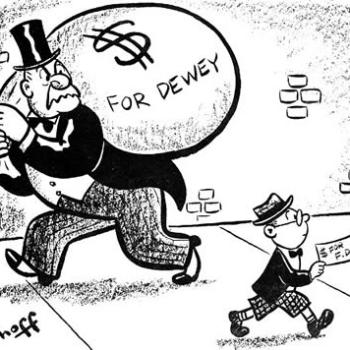Two recent posts — one by Dianna E. Anderson and one by Chauncey DeVega — tackle the same difficult question. They’re writing about different specific topics, but the underlying concern is the same.
The particular matter in Anderson’s post — “Loving at Arm’s Length” — considers the matter of Hugo Schwyzer, a male professor of gender studies whose current feminist writing is shadowed by his reprehensible “pre-sobriety” history of predatory and abusive behavior toward women. For more context (which may be disturbing), see “On Hugo Schwyzer” at Are Women Human?, which summarizes both his history and some of the recent discussion about what it means.
In Christian circles, that discussion inevitably comes to include the core Christian ideas of grace and forgiveness. Those are dangerous ideas. They are and ought to be scandalous ideas. But they can also be abused.
And it’s that abuse of those ideas that Anderson — and DeVega — examines. Here’s Anderson:
The question has continually arisen: “What about grace for Hugo? Isn’t it our duty to forgive what he did and honor his repentance?”
As Sarah Moon answered today, that is fundamentally the wrong question to ask: unlimited grace for the abuser means that we limit grace for the survivor.
Christianity is, first and foremost, about grace for the hurting, for the damaged, for the abused. Look at Jesus’ ministry: he spent a lot of time preaching about subverting the current social structure, the last shall be first, etc. He also spent his time healing. He healed those considered fundamentally unclean: lepers, beggars, the blind, the crippled. It is a fundamental message of Christianity that God brought the outcasts in. It is the fundamental grace of the upside down kingdom.
She goes on to discuss the scandalous wideness of God’s mercy — that grace extends, radically, to all the outcasts, ultimately extending to include the oppressor as well as to the oppressed. But while grace may ultimately include even the oppressor, grace does not begin with the oppressor.
The first word to Pharaoh is not “All will be well and all will be well,” but rather, “Let my people go.”
Instead of asking the wrong question — “What about grace for Hugo/this abuser?” — Anderson says:
The question needs to be “How can we protect and love the least of these? How do we show grace in a way that loves both the abuser and the abused?”
It doesn’t mean telling the abused that they need to set their own boundaries while we let the abuser run rampant.
It doesn’t mean telling the abused that they need to have grace and forgiveness for an abuser.
It doesn’t mean handing a man with a history of abuse a voice in a movement where abused people seek comfort.
… As a member of a religion that claims to love the outcast, I will always — always — prize the life of the abused over that of the abuser. Both are outcasts because of misused power, but one made the choice to wield power in a way that damaged, while the other is damaged because of that wielded power.
That same dynamic — including both those who used power to press down on others and those who were pressed down by that power — is at work in Chauncey DeVega’s post on “Empathy and Compassion for the Oppressor.”
DeVega is responding to a Psychology Today column by Mikhail Lyubansky on “Ten Things Everyone Should Know About White Privilege Today,” which he mostly commends as a helpful introduction to the subject. But he notes that Lyubansky’s ninth point is “problematic.” Here is Lyubansky:
9. The privilege discourse is missing an important element:empathy and compassion for the oppressor. Social justice activist, Kit Miller (a White woman), observes that empathy has a hard time flowing upstream.
… In the context of race relations, this means that there is not much empathy coming to white folks from across the racial divide. This, of course, is perfectly logical. It is certainly not the responsibility of the oppressed and marginalized to take care of the oppressor’s emotional needs. Suggesting otherwise would be, at best, an egregious expression of white privilege. Yet, it is also true that those who oppress others … are themselves harmed by their own actions or lack of thereof.
This is where DeVega slams on the brakes. He responds:
Lyubansky’s social justice take — that one needs to show empathy for those who are deeply invested in maintaining their disproportionate power and control over society to the disadvantage of people of color in mass — as Whiteness works to maximize the life chances of its owners, participants, and allies (to the detriment of others), is simply a bridge too far.
That bridge too far extends, I think, from Lyubansky’s asking the wrong question. “Should we have ’empathy and compassion for the oppressor’?” is the wrong question in precisely the same way as “What about grace for Hugo/this abuser?” is the wrong question.
It is the wrong question, in part, because other questions must come first.
The matter of “empathy and compassion for the oppressor” should not be introduced until we have first addressed, answered and satisfied the matter of empathy and compassion for the oppressed. And empathy for the oppressed means a refusal to settle for anything less than justice for the oppressed.
Only after that, after that is fully satisfied, can we turn to Lyubansky’s question as a valid concern. Until then, as Anderson writes, our understanding of grace or empathy or compassion must be one that “holds those who would do us damage accountable”:
This is a grace that recognizes the ways in which society privileges some voices over others, and a grace that chooses the damaged, the less-than’s, the have-not’s, over the voices of privilege.
















